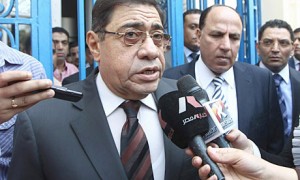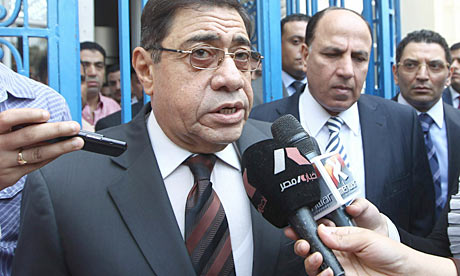
(AFP file photo)
The Human Rights Committee of the Lawyers’ Syndicate condemned on Saturday the Cairo Court of Appeals’ verdict overturning President Mohamed Morsi’s decision to dismiss former prosecutor general Abdel Meguid Mahmoud and appoint Tala’at Abdallah in his place.
The Cairo Court of Appeals issued the verdict on Wednesday, prompting a myriad of public criticism.
The committee held a press conference in the Lawyers’ Syndicate on Saturday, where the committee head Mamdouh Ismail stated that it is not possible for a court to cancel a presidential decree.
“There isn’t a single Administrative Court verdict, throughout Egypt’s legal history, which cancelled a constitutional declaration,” Ismail said.
He added that the committee’s stance is not a political one; it aims at strengthening legal and judicial stability. “This court verdict has dragged the country into political and legal problems,” he said.
A statement released by the committee during the press conference stated that the verdict violates Article 236 of the constitution, which cancels all constitutional declarations issued by the Supreme Council of the Armed Forces (SCAF) and the president since 11 February 2011 and until the constitution is enacted. The article, nevertheless, states that the declarations’ consequent effects remain valid.
In another press conference held by the Lawyers’ Syndicate’s Freedoms Committee at the same time, committee head Mohamed Al-Damaty stated that the court verdict disregarded the constitutional declaration’s sovereign nature.
“The president’s executive decisions, such as issuing constitutional declarations, cannot be overturned by the judiciary,” Al-Damaty said. “Only administrative decisions can be legally challenged.”
Mohamed Al-Rayes, coordinator of Egypt’s Lawyers Coalition, stated that Wednesday’s verdict cancelled the people’s will.
“The people voted on the constitution and approved it,” he said. “Any verdict which violates the constitution then violates the people’s will.”
Al-Rayes stated that Egypt’s Lawyers Coalition will legally pursue all judges which challenged the people’s will.
The committee’s statement cited a court verdict issued in February by the Ezbakiya Misdemeanour Court of Appeals. The Ezbakiya Court had turned down the case under the pretext that the prosecutor general is illegitimate. The Ezbakiya Court of Appeals, in turn, ruled on the case in specific and the prosecutor general’s legitimacy in general, stating that Abdallah was legitimately appointed.
The statement also highlighted Article 173 of the constitution, which states that the prosecutor general is appointed by the president after being selected by the Supreme Judicial Council and that his term should not exceed four years.
“Given that former Prosecutor General Abdel Meguid Mahmoud has exhausted his four-year term,” the statement read, “his return as a prosecutor general becomes unconstitutional.”
Islam Sokkar, one of the press conference speakers, condemned the opposition movement’s rejection of Abdallah. “I would like to remind those opposition leaders of the times we all protested together against Mahmoud,” Sokkar said. “They were then calling for reforming the judiciary by dismissing him. If Mahmoud was faithful to Mubarak and Abdallah is faithful to [President Mohamed] Morsi, then perhaps the next prosecutor general should be chosen to be faithful to the National Salvation Front!”
Prosecutor General Abdallah was appointed by Morsi in November 2012 as part of a constitutional declaration which was criticised for giving Morsi sweeping judicial powers. The declaration was later cancelled and replaced by another declaration, though Abdallah remained as the appointed prosecutor general.

